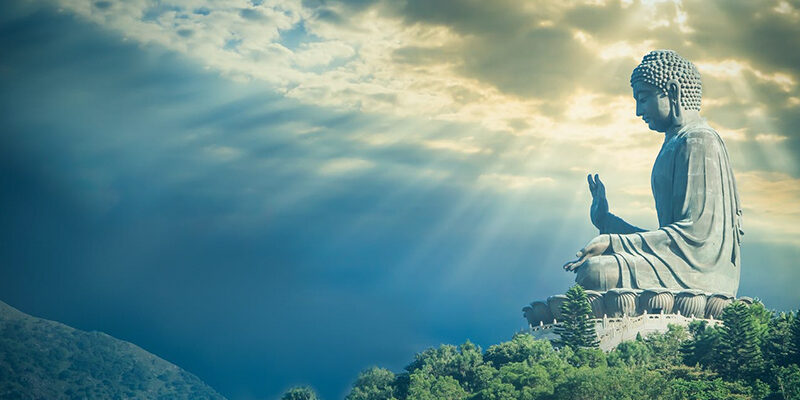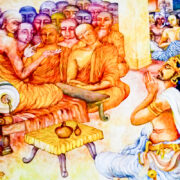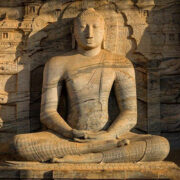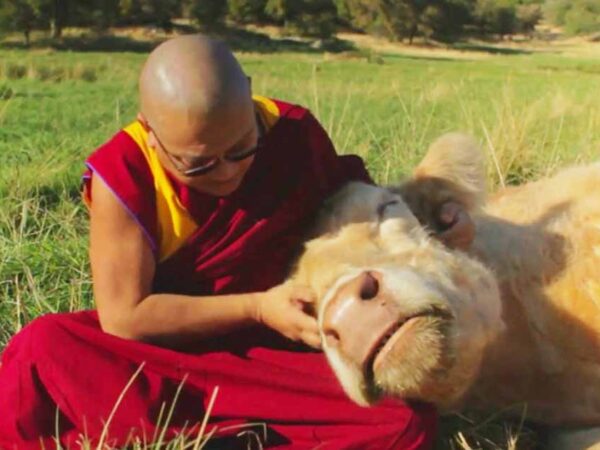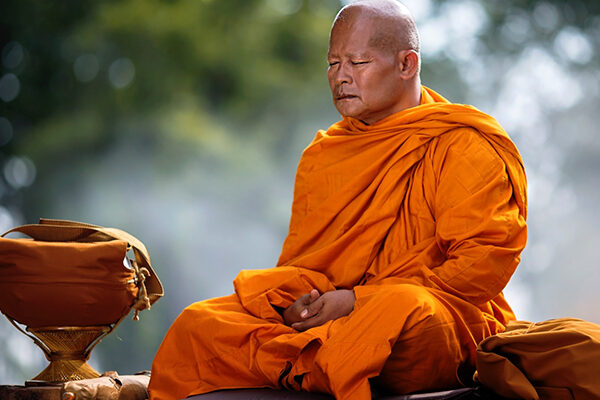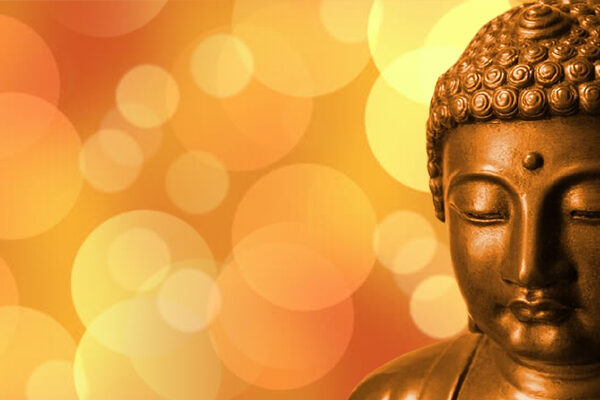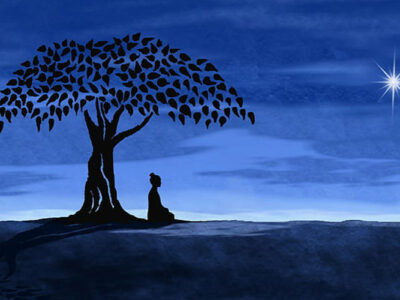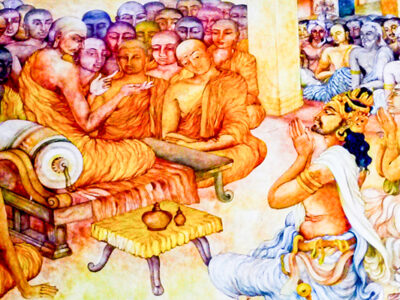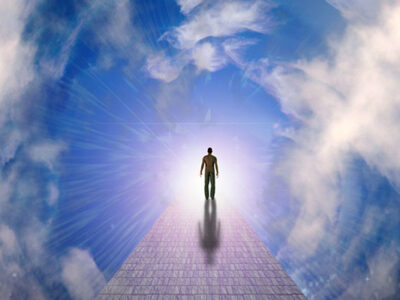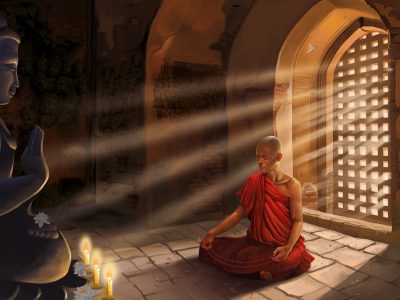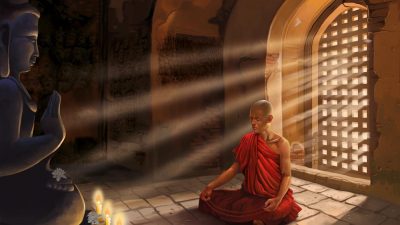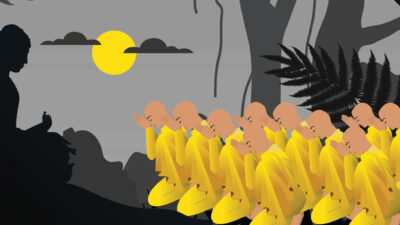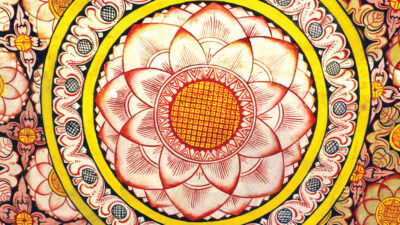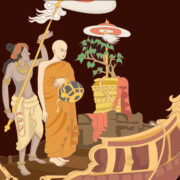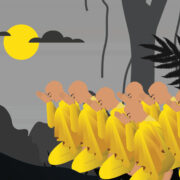By.Ven. Vira Dhammawara Maha Thera of Cambodia
On the full moon day of Vaisakha Purnima in the glorious land of India, one of the greatest men the world has ever produced was born. He was Prince Siddhartha of the Royal Sakya Clan of Kapilavatthu. Thirty five years later also on this day of Vaishaka, he attained the perfect Enlightenment under the Bodhi tree at Buddha Gaya and became Supreme Buddha; and it was on this day of Vaisakha too, after 45 years of service to humanity, that he passed away at the age of 80. This full moon day of Vaisakha is therefore, to be remembered and revered not only in India but all over the world, as it is connected with three great events in the life of the Great Buddha.
Today, people here in Asia and the world over, assemble to celebrate the Thrice Sacred Festival to commemorate the Three Events with great éclat and enthusiasm and pay their homage of obeisance to the Great Master.
Buddhists all over the world will be happy to know that the Union Government of India has also declared this day of Vaisakha a public holiday. This act so appropriately taken on this most auspicious occasion will strengthen the bonds of love and mutual understanding in the Buddhist world. Glory be to this sacred land, its Government and its people.
Living as we are today in a world torn asunder by conflict, and confusion uncertainty, we are more than ever before in need of the blissful ambrosia of the Buddha’s Teachings.
THE LIGHT
Speaking of him, I am reminded of the valuable words of Carlyle that ‘the history of the world was just the history of its great men’” and here I say that the history of India, nay of the world, will be incomplete without the history of the Buddha. He was called the Buddha because he attained the Supreme Enlightenment and the Highest Perfection, the final goal of man in the ladder of the law of evolution, and possessed greater insight into Truth than the rest of His Fellow-beings. He made the greatest contribution to the world’s knowledge and wisdom and enriched it with mental and spiritual wealth, the rarest gift of His enlightenment and intuition. He attained the ‘Asavakkhayan” the extinction of all biases of which. His heart and mind became white and pure, free from greed or selfish craving, hatred, delusion and evils which have coloured men’s minds and influenced their thoughts. Is not this selfish craving, this greed for wealth, power and domination the root cause of all troubles and unrest in the world to-day?
Just at a time when the world was in a chaotic conditions and people were suffering from untold miseries, which drove them to seek relief by curious performances, worshipping with sacrifice to appease the gods whom they believed to be the cause of their miseries and welfare, Buddha came to show the light and guided them on the right path to happy existence.
He was born on this earth as every man was, but through his own efforts. He became the enlightened one. He made no claim to be of divine birth or to be a messenger sent to this earth to save mankind from their sins. He simply pointed out to men the path to a harmonious and dignified life and guided them to eternal peace, the final goal attainable through many efforts. He told them to rely on themselves and said that there was no need for them to look to anything outside themselves for help and guidance to save them from the result of their sins. They should look for everything from within “Attahiattano natho”, “Self is the Lord of Self,” said He. If man trusts himself and tries to utilize his latent power and strength within, he will attain anything possible for a man to achieve without resorting to any outside help. He indeed pointed out to them that they can make or mar themselves, they are the creators of their own happiness and miseries and no one else, “Ye reap what ye sow,” He added.
UNTO YOURSELF
While consoling Ananda, His chief Attendant who grieved realizing the imminent passing away of the Master, He said,
“Ananda, be a lamp unto yourself; be an island for yourself; take to no external refuge, Work diligently and you will soon be free from alL worldly bondage as I am.”
Are not these words the quickening tonic of self-reliance and self-sufficiency which is the panacea of all worldly ills?
NOT ATHEISM
Let no man think that a Buddhist is an atheist as he is often understood to be. He is neither a theist not an atheist. His attitude of mind is not to lend support or to reject, but to maintain perfect equanimity and follow the middle path, taught by the Buddha. His aim in life is to strive, to perfect and get himself enlightened, so that he may be able to help others to be enlightened. This he fully knows can be achieved through his own efforts. He does not pray but develops his mind through meditation and radiates his loving kindness and goodwill to all.
EQUALITY OF MAN
While fighting the evil of racial prejudices and the caste systems that created watertight compartments between men, He proclaimed the equality of man and said,
Not by birth a man is a Brahmin (High Caste) or a Sudra (Low Caste) by deed alone, a man is a Brahmin or a Sudra, by deeds alone, man is divine or a devil.”
Therefore, there is nothing for a sincere man to be afraid and ashamed of in this world, but his own misdeeds. This is the teaching that men of today need. For it emboldens them to stand erect on their legs, and shoulder their own responsibility independently. It is not a religion of the weaklings that teaches them to look to someone else for help to escape from the result of their sins and misdeeds. It is a religion, if it must be called so, for brave men and women who fear nothing in the world, but their own misdeeds, and who depend on nothing but their own good deeds and right actions. Buddha then said.
“By oneself evil is done, by oneself evil is left undone, purity and impurity are matters of personal concern, no one actually can purify another.”
HUMANIST VIRTUES
Buddha’s teachings, therefore, make man self-supporting. Self-reliance and self-Enlightenment, virtues which are the basic principle of true freedom, come from this.
Buddha’s universal love and compassion for life was boundless, while He was going about preaching his lofty doctrine to the multitudes along the Gangetic valley. He not only condemned but challenged the validity of religious sanction for sacrifices performed in the name of God and religion, particularly those involving blood-shed and killing. He made man look on all lives whether high or low, big or small, as equal partners of the wonderful gift of nature, this world we are living in. He urged them not to be cruel to animals and hurt them in any way, but to love them and nurse them and give them comfort when they fell sick.
From the inscriptions on our stone, pillars we have learnt that Asoka the Great built hospitals and Nursing Homes throughout his vast empire not only for men but also for animals. Here is found the ancestor to “The Society for Prevention of Cruelty to Animal,” commonly believed to have started from the West.
NO SLAVERY| said Buddha
Another great humanitarian service the Buddha rendered the World was the abolition of slavery. This commendable act of his was justified by his condemnation and prohibition of slavery and trafficking in human beings wherever he went. This, once again, throws light on the fact that it was not William Wilberforce who was the first man to start the movement for the abolition of slavery, but it had its origin in the Gangetic valley two thousand five hundred years ago.
BUDDHISM A WAY OF LIFE
Buddhism is in the true sense of the word a way of life. It is the path of liberation from superstition, and worldly bondages. It is a teaching of serene and dignified life which is in utter contrast with that of fear and penitence. It is a religion of boundless loving kindness, as never a man or even an animal has been persecuted or killed in its name. Yet Buddha made no claim to give heaven or salvation to anybody. He simply showed the path through which a man can work out his way to complete freedom and happy existence, the path on which he himself crossed over the ocean of Samsara to the other shore of eternal bliss of NIRVANA. Man is entirely free to follow or not to follow his footsteps.
“ACCEPT TRUTH ONLY”
To Kalama, he said,
“Kalama, do not accept anything simply because it has been said by your teacher, or merely because it has been written in your sacred book, or merely because it has been believed by many, or because it has been believed by many, or because it has been handed down to you by your ancestors, Accept and live only that which you see truth face to face.”
With these words Buddha taught men the greatest freedom of thought and action ever known to mankind. Never in the history of religion have such words been heard of.
FROM THE BIRTH CRADLE
Buddhism was born in calm and peaceful atmosphere, under the giant Bodhi Tree at Buddha Gaya, in Bihar. It needed no battlefield of sword of symbolism to establish and propagate itself. Among the great teachers and prophets, Budha lived the longest life for the service of the suffering world. If man of this earthly world gives ear to the message of this great Sage and follows His footsteps, there will be no miseries, but peace and happiness will prevail all over the world as it was at the time of Asoka the Great. No doubt, a message, that made an empire-thirsty monarch like Asoka renounce his ambition, hatred and the sword, in favour of love and virtue after the victorious battle of Kalinga where mass massacre and horrible blood-shed took place, will not fail to day to bring peace to the world, as it once did in the past. It was Asoka who sent emissaries of peace and good-will to the whole of Asia and to some parts of Europe as well 2,300 years ago.
TOWARDS PEACE
Will leaders of countries given ear to the message of this great Sage and follow the example of Asoka the Great by renouncing hatred and the sword and planting the tree of love and virtue in their place and thus make their countries peaceful heavens worth living in? If they do, I have no hesitation in saying that peace will prevail everywhere.
May peace be to all beings!

